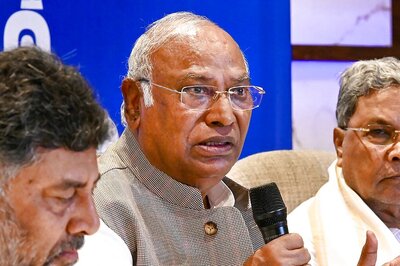
views
Two years after India opened its government-led space sector for private players, it is ready to launch the country’s first privately designed rocket from the Indian Space Research Organisation (ISRO)’s launch pad at Sriharikota on Friday morning. It will be the first time the national space agency would lift off a launch vehicle completely built and integrated by an indigenous start-up.
The rocket, named Vikram-S, would begin its ascent into space between 11 am and 12 noon depending on the weather conditions from the Satish Dhawan Space Centre, Sriharikota, near the Andhra Pradesh coast. The 6-m-tall rocket weighing about 545 kg would carry three small customer payloads in its test flight.
Two IIT alumni behind India’s private space dreams
Named after the father of India’s space programme, Vikram-S is a suborbital rocket developed by Hyderabad-based start-up Skyroot Aerospace. Founded by two IIT alumni who have worked with ISRO in the past as scientists — Pawan Kumar Chandana from IIT Kharagpur and Naga Bharath Daka from IIT Madras— the start-up currently has 200 employees. In just four years of its existence, it has become the largest-funded private space start-up in India with Rs 526 crore raised as capital to date.
The mission authorised by department of space’s autonomous agency — the Indian National Space Promotion and Authorisation Centre (IN-SPACe) — is the first of the series of private launches that the country is set to witness in coming years, and the fourth such authorisation to a non-government entity by the department of space.
Skyroot was also among the first start-ups to register with IN-SPACe when it opened the doors of the space sector for private entities in 2020. In the last two years, as many as 60 start-ups have come forward to work with IN-SPACe, which has received more than 150 applications from space non-government entities for authorisation, facilitation, and promotion of their space endeavours. The mission too is titled ‘Prarambh’ (beginning), marking the start of a new era in India’s private space economy.
“India’s space sector is going through tremendous changes thanks to the government’s holistic policies to promote the space sector, and to facilitate involvement by private players,” said Pawan K Goenka, chairman, IN-SPACe. “I hope the Vikram-S rocket marks the start of a new age in India’s private space domain.”
More about Vikram-S
The 6-m-tall rocket, Vikram-S, is a single-stage solid fuelled, suborbital test launch vehicle, which took about two years to develop. It weighs about 545 kg and, in its maiden flight, it will carry three customer payloads belonging to SpaceKidz India – which had also designed Azadi-SAT for ISRO’s SSLV rocket in August, and BazoomQ Armenia and N-Space Tech India. The payloads are equipped with sensors for the measurement of acceleration, pressure, etc.
With a payload capacity of 83 kg to 100 km altitude, it will look to hit the Karman line on Friday morning – the 100 km altitude which divides the space from earth’s atmosphere and mark its successful entry into space.
The launch on Friday would be a sort of technology demonstration to showcase the capabilities of the company which has used its propulsion system, Kalam 80, and spin stabilisation system for the rocket. This rocket will help validate the technologies that will be used in the subsequent Vikram-1 orbital vehicle of Skyroot that is planned for launch next year, subject to technical clearance from IN-SPACe. The start-up eventually plans to pitch itself as a company offering one of the quickest and most affordable rides to space, and could become part of ISRO’s journey to evolve into a preferred destination for cost-effective delivery of satellites into space.
Read all the Latest India News here




















Comments
0 comment